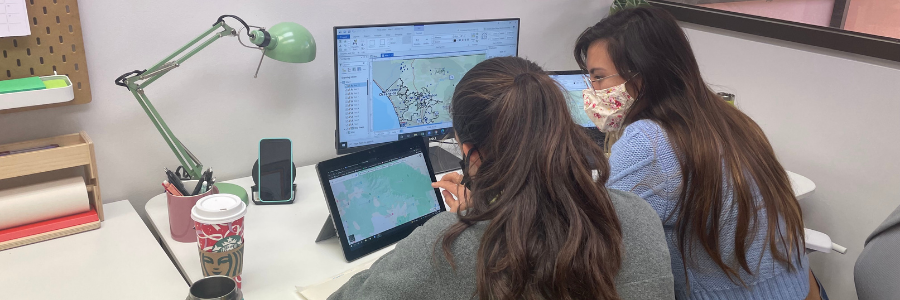Dr. Megan Welsh and team awarded Rapid Response Grant to research state of San Diego’s Public Restrooms
Dr. Megan Welsh in the School of Public Affairs, Dr. Madi Swayne in City Planning, Dr. Jen Felner in Public Health, and a student team working to identify problems and find solutions.

Dr. Madi Swaynee (left) and Adriana Rios (right) working to map spatial data on built restroom facilities in San Diego County.
by Aleesia Benkey
February 10, 2022
In November 2021, the SDSU Rapid Response Program granted funding to principal investigator Megan Welsh of the SDSU School of Public Affairs to begin research on the public restroom crisis in San Diego County. The project’s interdisciplinary team including Dr. Madi Swayne and Dr. Jen Flener is supported by project members from three schools working to find solutions to the longstanding lack of sufficient and sustained public restrooms.
The project is split into three components and is expected to complete by late spring 2022. The first component is the process of developing a first-of-its-kind spatial database of every public restroom in San Diego County. This extensive mapping is being completed using online research as well as fieldwork to establish a comprehensive list of all city, county, port, transit, and other public restrooms. This report will be completed by the end of Feb. 2022.
“The lack of public restrooms is a widespread crisis that contributes to the lack of access to sanitation and hygiene; ultimately, resulting in a public health concern that puts all citizens in danger and more susceptible to diseases,” said lead mapping student, Psychology major Adriana Rios. “Using the restroom is a universal need and fundamental human right that should be inclusive, equitable, and available to all people and in all cities. In order to justify the need for more public restrooms in San Diego, there is a hierarchy of steps that must be taken prior to implementing change.”
The second component, a field assessment, is being spearheaded by other students on the team. They are developing a tool to assess the quality and accessibility of the facilities in order to compare them to one another. This includes creating an assessment checklist, establishing the available resources in each facility, and connecting a real life location with the work of the mapping team.
The third and final component of the research is a survey to better understand the needs of vulnerable populations, including unhoused individuals, and their public facility needs. In partnership with homeless surveying nonprofit, Think Dignity, the survey will be distributed to better understand the needs of those who use public restrooms and to establish the community’s perspective on their state.
“Our research provides us with a strong foundation for addressing this social need, vindicating for this change to follow, and shifting the power dynamic that lies within the success of educating and swaying minds to adopt this similar awareness,” shares Rios. “Ultimately, our hope is that our research will impact the community by bringing attention to and justification for more adequate, fair, and equal access to sanitation and hygiene.”
The team expects results to be published by late spring and shared with the SDSU and the San Diego communities.
The content within this article has been edited by Lizbeth Persons.
More PSFA Stories